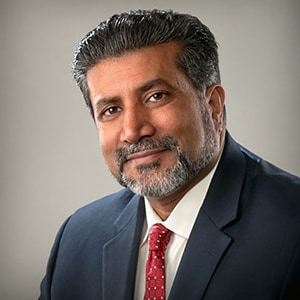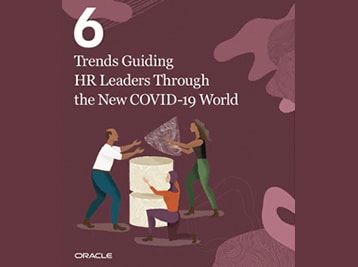Gallagher overcomes ‘green screen effect’ with Oracle Cloud HCM
Modern human resources tools improve productivity and support the insurance company’s acquisition-driven growth strategy.
By Linda Currey Post | September 2020

When Sufel Barkat joined Gallagher five years ago to lead the modernization of its human resources computer systems, he quickly diagnosed the core problem: the “green screen effect.”
The insurance company’s 26,000 employees suffered through the headaches, frustration, and exhaustion of working with applications written in the mainframe era, struggling to navigate their daily work without modern interfaces and capabilities.
As Barkat, vice president of human resources information systems, and the HR executive team evaluated technology remedies, the company’s storied ability to grow through acquisitions hung in the balance.
Since 1927, when Arthur J. Gallagher first opened the doors of his namesake insurance agency in Chicago, the company has grown through acquisitions and partnerships. During the last five years, the company—now known simply as Gallagher—acquired some 300 new merger partners. In 2019 alone, it completed 49 acquisitions with estimated annualized revenue of $468 million. The company now offers its insurance, risk management, and consulting services to businesses and individuals in more than 150 countries.
After the acquisition
Tasked with supporting Gallagher’s continued expansion by acquisition, Barkat started with a fresh look at the company’s HR system, which he knew would provide a bedrock for further growth. For example, Barkat realized a cloud-based HR system would let the company more easily bring employees who join Gallagher through acquisitions into the fold under a standard set of rules governing salaries, benefits, and promotions.
“Employees are now able to get feedback a lot more often, so they can make changes in their behavior a lot sooner.”
As he and his C-level colleagues evaluated cloud-based HR systems, Oracle Cloud Human Capital Management (HCM) drew their attention for several reasons:
- Gallagher HR leaders can update the company’s policies and practices from headquarters, then distribute those changes through the cloud at every location around the world.
- Those applications accommodate local regulations about salary requirements, work hours, and retirement contributions.
- Oracle automatically updates its applications via the cloud four times each year, which lets Gallagher know that it’s using the latest and best HR practices.
- Through the self-service functions of the software, Gallagher employees can update their own employee information.
- Company leaders can use the modules of Oracle Cloud HCM to automate HR tasks from “hire to retire.”
Easing into the cloud

Sufel Barkat, Vice President of Human Resources Information Systems, Gallagher
Despite the draw of cloud-based systems, the decision-makers at Gallagher wanted reassurance that software in the cloud would meet their expectations before they abandoned their familiar on-premises system. With implementation partner Cognizant, Barkat and the team used what they called a “co-existent cloud” approach.
They kept their payroll, time and labor, benefits, and talent management functions on their legacy system. Then “to get our feet wet in the cloud,” Barkat says, the team implemented the compensation module of Oracle Cloud HCM. The team chose compensation as its test case because they could wall off those processes so the test would not interfere with other core business functions. Only about 10 Gallagher compensation experts—who previously did all their calculations using spreadsheets—would need to spend time on the test.
“They came back with rave reviews,” Barkat says. “They said, ‘This is working great, we love it.’ The ease of use was high and the learning curve very low. They became experts in no time.”
Barkat also called about 10 other companies that were transitioning to the cloud to learn about their successes and challenges. Then he met with Oracle’s software developers to learn more about the long-term cloud strategy to be sure it matched Gallagher’s priorities.
Three steps to success
Barkat took the lessons learned and built a three-step approach to cloud implementation:
- Get employee and executive buy-in for your roadmap before starting implementation.
- Start with noncritical applications then phase others in, giving employees plenty of time, education, and support. “Let everyone get used to the cloud,” he says.
- Choose your implementation partner carefully. Barkat invited six firms to send in the individuals who would actually be working on the cloud implementation to present their implementation plans. KBACE—a company since acquired by Cognizant—sent experts in core HR, benefits, recruiting, and compensation to answer questions from the Gallagher team, and it got the contract.
Gallagher went live with Oracle Cloud HCM in April 2018, and, a year later, added modules to automate payroll, and track employee attendance and absences. In the process, Gallagher streamlined many of its HR processes, most notably increasing the frequency of performance reviews—previously conducted annually—between employees and their managers.
By moving to the cloud, Gallagher is on track to save 30% on its overall HR tech costs during the next five years.
“Employees are now able to get feedback a lot more often, so they can make changes in their behavior a lot sooner,” Barkat says. He notes that the performance goals that feed the evaluation process can also change much more frequently, to reflect evolving expectations. “Everything is integrated,” he notes.
The company has also used Oracle Cloud HCM modules to standardize recruiting, simplify payroll processes, and improve reports to executives. And employees have steadily traded in their spreadsheets and paper-based processes for more automated equivalents.
Barkat figures Gallagher is on track to save 30% on its overall HR tech costs during the next five years by moving to the cloud. He looks forward to continued improvements and credits the teamwork between Gallagher and Cognizant for the success so far. “I know that putting the right people together is what makes projects successful,” Barkat says. “The Gallagher business owners and our implementation partner are making it happen.”
Photography: Gallagher
Illustrations: Oracle




